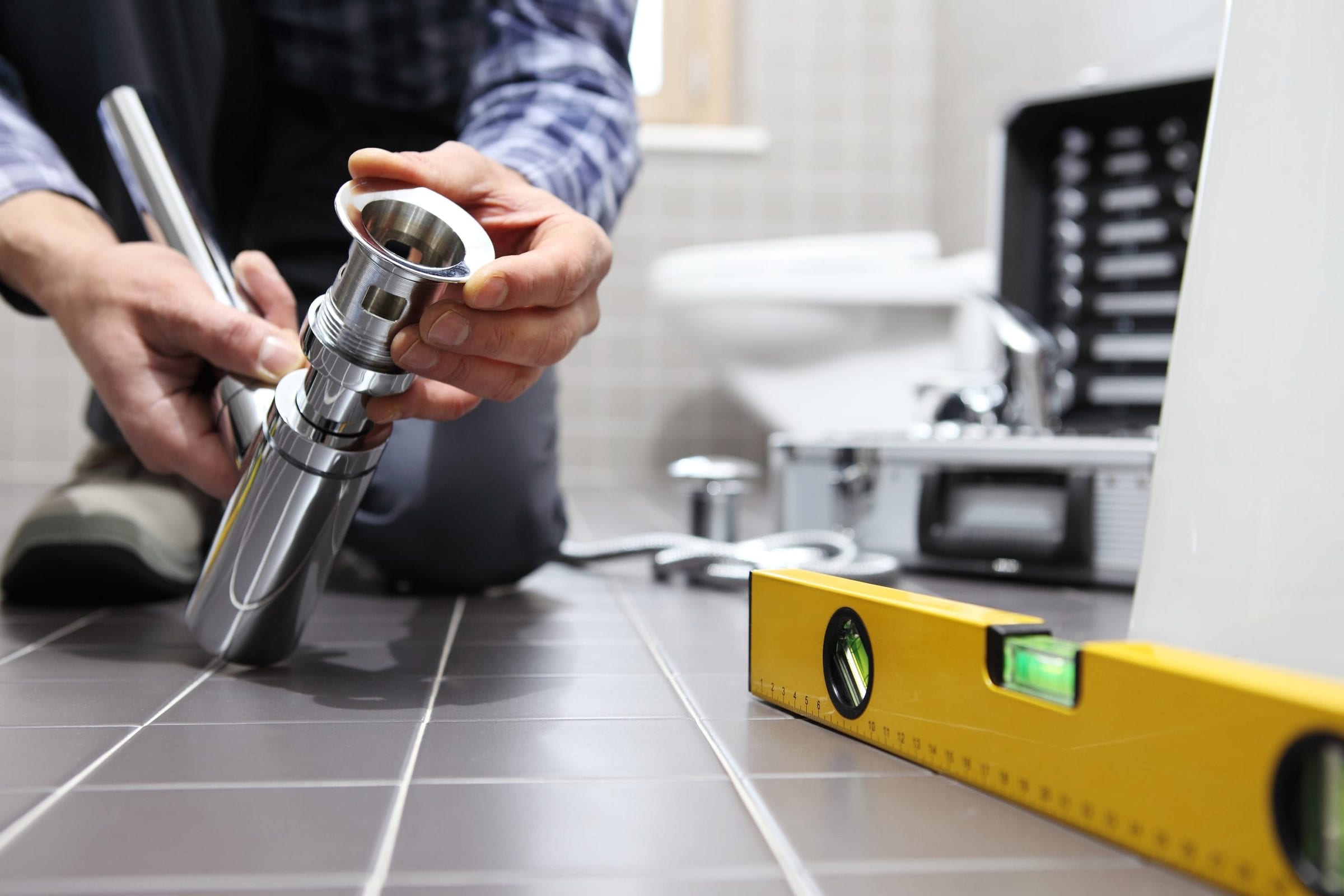Home>Home Maintenance>How To Get Help For Home Repairs


Home Maintenance
How To Get Help For Home Repairs
Modified: March 6, 2024
Learn how to get help for home repairs and maintenance with our comprehensive guide. Find expert tips and resources for all your DIY projects.
(Many of the links in this article redirect to a specific reviewed product. Your purchase of these products through affiliate links helps to generate commission for Storables.com, at no extra cost. Learn more)
Introduction
Welcome to our comprehensive guide on getting help for home repairs. Whether you’re a homeowner or a renter, it’s inevitable that you’ll encounter maintenance issues that require professional assistance. From leaky faucets to electrical problems, having a reliable and skilled contractor is essential to keeping your home in top condition. In this article, we’ll walk you through the step-by-step process of finding, hiring, and working with a contractor to ensure your home repairs are handled efficiently and effectively.
Assessing the Repair Needs:
Before you start searching for a contractor, it’s important to assess the repair needs of your home. Take some time to make a list and prioritize the issues that require immediate attention and those that can wait. This will help you communicate your needs to the contractor and ensure that they understand the scope of the work.
Researching Local Repair Services:
Once you have a clear understanding of your repair needs, it’s time to research local repair services. Start by asking for recommendations from friends, family, or neighbors who have had similar repair work done in the past. You can also use online directories and review websites to find reputable contractors in your area. Look for contractors who specialize in the specific type of repair you need to ensure they have the necessary expertise.
Requesting Estimates:
Contact a few different contractors and request estimates for the repair work. Provide them with detailed information about the project, including any specifications or materials you have in mind. This will help the contractors provide accurate estimates for the cost and timeline of the project. It’s a good idea to request written estimates for comparison purposes.
Checking References and Reviews:
Before making a decision, take the time to check the references and reviews of the contractors you are considering. Ask for a list of previous clients and contact them to inquire about their experience with the contractor. Additionally, read online reviews and ratings to get a sense of the contractor’s reputation. This step will help you ensure that you are hiring a reliable and trustworthy professional.
Comparing Estimates and Services:
Once you have received multiple estimates, compare them based on cost, timeline, and the services included. Be cautious of extremely low estimates, as they may indicate subpar workmanship or the use of low-quality materials. Consider the reputation of the contractors, the completeness of their proposals, and any additional services they may offer.
Negotiating Pricing and Terms:
If the estimates are within your budget, you can start negotiating the pricing and terms with the selected contractor. It’s important to communicate your expectations clearly and ensure that everything is outlined in a written contract. Discuss payment schedules, additional costs, and any warranties or guarantees included in the agreement.
Key Takeaways:
- Assess your home repair needs by making a list of urgent and non-urgent repairs. Prioritize safety issues and consider your budget before hiring a contractor.
- Research local repair services, request estimates, and check references before hiring a contractor. Communicate clearly, monitor the repairs, and finalize payments for a successful home repair project.
Assessing the Repair Needs
Before you begin your search for a contractor, it’s crucial to assess the repair needs of your home. This step is essential in order to effectively communicate your requirements to the contractor and ensure that they understand the scope of the work.
Start by making a list of all the repairs that need to be addressed. Take a walk through your home and note any issues you come across, such as leaky faucets, malfunctioning appliances, or damaged fixtures. It’s also a good idea to take note of any potential safety hazards, like exposed wires or loose floorboards, that need immediate attention.
Once you have a comprehensive list, prioritize the repairs based on their urgency and significance. Identify the repairs that need to be addressed immediately to prevent further damage or potential safety risks. These may include issues like a leaky roof or a faulty electrical system. On the other hand, there may be repairs that are more cosmetic in nature and can be tackled at a later time.
Next, evaluate your own capabilities and determine if there are any repairs that you can handle yourself. If you have the necessary skills and tools, taking on certain tasks as DIY projects can help save money. However, it’s important to be honest with yourself about your abilities and only attempt repairs that you are confident in completing properly.
For repairs that go beyond your expertise, it’s important to seek professional help. Hiring a contractor ensures that the repairs are done correctly and efficiently, giving you peace of mind that the job will be completed to a high standard. Additionally, some repairs may require specialized knowledge and equipment that only professionals possess.
Finally, consider your budget when assessing the repair needs. Determine how much you are willing and able to spend on the repairs. This will help you prioritize the repairs and make informed decisions when it comes to selecting a contractor.
By assessing the repair needs of your home, you will have a clearer understanding of the repairs that need to be addressed and the urgency with which they need to be fixed. This knowledge will guide you throughout the rest of the process, from researching local repair services to hiring a contractor who specializes in the specific repairs you require.
Researching Local Repair Services
Once you have assessed the repair needs of your home, the next step is to research and find local repair services that are reputable and reliable. It’s important to choose a contractor who specializes in the specific type of repair you need, as they will have the expertise and experience to handle the job effectively.
Start by asking for recommendations from friends, family, or neighbors who have recently had repair work done. Personal recommendations are a valuable resource as they come from people you trust and can provide firsthand experiences with contractors.
Another great way to find local repair services is through online directories and review websites. These platforms allow you to search for contractors in your area and provide reviews and ratings from previous customers. Look for contractors with consistently positive reviews and high ratings, as this indicates their professionalism and quality of work.
When researching local repair services, pay attention to their specialization. Some contractors may focus on specific areas, such as plumbing, electrical work, or HVAC systems, while others offer a broader range of services. It’s important to choose a contractor who has experience and expertise in the specific type of repair you need to ensure that the work is done correctly.
As you narrow down your list of potential contractors, take the time to visit their websites. A professional and informative website is a good indication of a reputable contractor. Look for details about their services, experience, and any certifications or licenses they hold. The website should also provide contact information, allowing you to reach out to them for further inquiries.
In addition to online research, consider reaching out to local trade organizations or professional associations for recommendations. These organizations often have a directory of members who adhere to certain industry standards and codes of ethics. By choosing a contractor who is a member of such an organization, you can have confidence in their professionalism and commitment to quality.
Once you have compiled a list of potential contractors, contact them to discuss your repair needs and inquire about their availability. Take note of how responsive and communicative they are, as this will be an important factor throughout the entire repair process.
Remember to ask for proof of insurance and any necessary licenses or permits. A reputable contractor will have the appropriate credentials and will be willing to provide you with this information. This ensures that you are protected in case of any accidents or issues that may arise during the repair work.
By thoroughly researching local repair services, you can find a contractor who is not only skilled and reliable but also matches your specific repair needs. This sets the stage for a successful and satisfactory repair experience.
Requesting Estimates
Once you have researched and identified potential contractors for your home repair project, the next step is to request estimates. Obtaining estimates from different contractors will allow you to compare pricing, assess the scope of work, and make an informed decision about who to hire.
When requesting estimates, it’s important to provide detailed information about the repair project. Be specific about the repairs you need and any special requirements or preferences you have. This will help the contractors understand the scope of work and provide accurate estimates.
Contact each contractor either by phone or through their website and explain your repair needs. It’s a good idea to have your list of repairs and any relevant measurements or specifications on hand during these conversations.
Some contractors may be able to provide rough estimates over the phone or through email based on the description you provide. However, for more accurate estimates, it’s often necessary for the contractor to visit your home and assess the repairs in person.
Schedule appointments with all the contractors you are considering to visit your home and provide estimates. During the visit, walk them through each repair area and point out any specific concerns or requests. This face-to-face interaction also allows you to gauge their professionalism, knowledge, and communication skills.
During the estimate process, ask questions and clarify any doubts you may have. Inquire about the timeline for completing the repairs, the materials they plan to use, and any warranties or guarantees they offer. The more information you gather during this stage, the better equipped you will be to make an informed decision.
It’s a good practice to request written estimates from each contractor. This provides a clear and detailed breakdown of the costs involved, including labor, materials, and any additional fees or charges. Make sure the estimates have a validity period mentioned, as it will give you time to make comparisons before making a decision.
While cost is an important factor, it’s not the only consideration when choosing a contractor. Take into account their experience, reputation, and the overall value they offer. A contractor with a slightly higher estimate may have a better track record and provide superior quality work compared to one with a lower estimate.
After you have received estimates from all the contractors, take the time to review and compare them. Look for any discrepancies in the pricing or scope of work. Ensure that each estimate includes all the repairs you discussed and aligns with your expectations.
By requesting estimates from multiple contractors, you can evaluate their pricing and services to make an informed decision. This step is crucial to ensure that you hire a contractor who not only fits within your budget but also delivers quality workmanship and meets your repair needs.
Checking References and Reviews
Before making a decision on which contractor to hire for your home repair project, it is crucial to check their references and reviews. This step will help you gain insights into the contractor’s previous work, professionalism, and reliability. Checking references and reviews is a valuable way to ensure that you are hiring a reputable contractor who will meet your expectations.
Start by asking the contractor for a list of references. These are previous clients who have worked with the contractor in the past. Contact these references and ask specific questions about their experience working with the contractor. Inquire about the quality of work, punctuality, communication, and overall satisfaction with the project. It’s important to listen to their feedback and take note of any concerns or red flags that may arise.
In addition to checking references, take advantage of online review platforms and websites that provide ratings and feedback for contractors. Look for websites that focus on home services and have a large number of reviews. Read through both positive and negative reviews to get a well-rounded understanding of the contractor’s reputation.
Pay attention to patterns in the reviews. Look for consistent feedback on key aspects such as professionalism, work quality, timeliness, and communication. It’s natural to come across a few negative reviews, but focus on the overall sentiment and majority opinion.
Keep in mind that not all review platforms are created equal. Some websites may have biased or manipulated reviews, so it’s important to use multiple sources and cross-reference the information. Consider trusted platforms and verified review websites to ensure authenticity and reliability.
Another valuable source of information is word-of-mouth recommendations. Talk to friends, family, and neighbors who may have had repair work done and ask for their experiences and recommendations. Personal recommendations carry weight as they come from people you trust and who have firsthand experience with the contractor.
During this stage, it’s important to be thorough and diligent. Don’t hesitate to ask for additional references or contact more than one reference per contractor. The more you gather perspectives from different sources, the better you can assess the contractor’s reputation and track record.
If you come across any red flags or consistent negative feedback during the reference and review process, proceed with caution. Consider it as a warning sign and explore other options if needed. On the flip side, receiving positive feedback and glowing reviews is a strong indicator of a reputable and reliable contractor.
By checking references and reviews, you can gather valuable insights about a contractor’s past performance and reliability. This step is essential to ensure that you hire a contractor who has a solid track record, positive customer experiences, and will deliver quality workmanship on your home repair project.
Comparing Estimates and Services
After receiving estimates from different contractors for your home repair project, it’s time to compare them. Comparing estimates will help you make an informed decision about which contractor offers the best value for your needs. It’s important to consider not only the pricing but also the services included and the overall reputation of the contractors.
Start by reviewing each estimate in detail. Look for any discrepancies in the pricing, scope of work, or materials listed. Ensure that each estimate includes all the repairs and services you discussed with the contractor. It’s important to have a clear understanding of what is and isn’t included in each estimate.
Consider the breakdown of costs in each estimate. Look for any variations in labor costs, material costs, or additional fees. Keep in mind that the cheapest estimate may not always be the best option. Quality workmanship and reliable service should also be taken into consideration.
Assess the reputation and reliability of each contractor. Consider their experience, certifications and licenses, and the overall feedback from references and reviews. A contractor with a strong reputation may be worth a slightly higher estimate if it means getting quality work and peace of mind.
Look for any additional services or value-added benefits offered by the contractors. This could include warranties, guarantees, or any follow-up maintenance services. Consider the overall value and benefits that each contractor provides beyond the initial repair work.
Take into account the timeline for completing the repairs. If one contractor can start sooner or complete the work faster than others, it may be a factor to consider, especially if the repairs are urgent or time-sensitive.
Don’t hesitate to ask questions and seek clarification from the contractors. If there are any parts of the estimates that are unclear or if you require more information, reach out to the contractors for clarification. Clear communication and transparency are important factors to consider throughout the decision-making process.
It’s also a good idea to revisit the references and reviews for each contractor. Consider the experiences of previous clients and any feedback that may further support or challenge your decision. Look for patterns in the reviews and consider them alongside the estimates and other factors.
Ultimately, the goal is to choose a contractor who offers a fair price, quality workmanship, reliable service, and a good overall value. Don’t rush the decision-making process; take the time to carefully compare the estimates and services before making your final choice.
By comparing estimates and services, you can make an informed decision about which contractor best meets your needs and budget. Selecting the right contractor sets the stage for a successful and satisfactory home repair project.
Negotiating Pricing and Terms
Once you have reviewed and compared the estimates from different contractors for your home repair project, it’s time to negotiate pricing and terms with the selected contractor. Effective negotiation can help you secure a fair price and agree on terms that work for both parties involved. Here are some tips to navigate the negotiation process:
1. Have a clear budget: Before entering into negotiations, establish a budget that you are comfortable with. This will serve as a guideline during the negotiation process and help you determine your limits.
2. Highlight the value you bring: If you have received multiple estimates from different contractors, use this as leverage during negotiations. Let the contractor know that you have other options and highlight any added value they can provide to make their offer stand out.
3. Discuss payment terms: Discuss and negotiate the payment terms with the contractor. Determine how much you are expected to pay upfront, whether there will be installments, and when the final payment will be due. Clear communication and agreement on payment terms will help avoid misunderstandings later on.
4. Seek alternative options: If the initial estimate is higher than your budget, consider discussing alternative options with the contractor. They may be able to suggest lower-cost materials or alternative approaches to the repairs that can help bring the price down without compromising quality.
5. Ask for discounts or incentives: Don’t be afraid to ask the contractor if they can offer any discounts or incentives. Contractors may be open to providing discounts for various reasons, such as scheduling flexibility or bundling multiple repairs together.
6. Understand the breakdown of costs: Request a breakdown of costs from the contractor to understand how the estimate is calculated. This will give you a clear picture of where the expenses are concentrated and allow you to negotiate specific items if needed.
7. Get everything in writing: Once you reach an agreement with the contractor, ensure that all the negotiated pricing and terms are documented in a written contract. This will protect both parties by providing a clear reference point and avoiding any miscommunications later on.
8. Be respectful and professional: Keep in mind that negotiations should be approached in a respectful and professional manner. Maintain open lines of communication, listen to the contractor’s perspective, and be willing to compromise where needed.
Remember, negotiations should aim for a win-win outcome, where both parties feel satisfied with the agreement reached. Effective negotiation can help you secure a fair price and establish clear terms for your home repair project.
Hiring a Contractor
After assessing the repair needs, researching local repair services, and going through the negotiation process, it’s time to make a decision and hire a contractor for your home repair project. Here are the key steps to follow when hiring a contractor:
1. Review the contract: Carefully review the contract provided by the selected contractor. Ensure that all the agreed-upon terms, pricing, and scope of work are clearly outlined in the contract. If there are any concerns or discrepancies, address them with the contractor before signing the contract.
2. Verify insurance and licenses: Prior to hiring a contractor, it’s crucial to verify their insurance coverage and licenses. Ask for proof of general liability insurance and workers’ compensation coverage to protect yourself from any liability in case of accidents or damages during the repair process. Confirm that the contractor holds the necessary licenses and permits required by local authorities.
3. Request a timeline and schedule: Discuss the expected timeline for the project with the contractor. Confirm when the work will begin, how long it is expected to take, and any potential factors that could impact the schedule. Having a transparent schedule will help manage expectations and ensure that the project stays on track.
4. Define communication channels: Establish clear communication channels with the contractor. Determine how you will stay in touch throughout the project, whether through phone calls, emails, or in-person meetings. Regular communication is vital to address any concerns or updates that may arise during the repair process.
5. Set payment terms: Finalize the payment terms with the contractor based on the previously negotiated terms. Determine the payment schedule, including any deposits and final payments, and have it outlined in the contract. Make sure that the payment terms align with your budget and expectations.
6. Obtain necessary permits: If the repair work requires permits, it’s important to clarify who will be responsible for obtaining them. Local authorities may require permits for certain types of repairs or renovations, and it’s crucial to comply with these regulations to avoid legal complications.
7. Communicate any special requirements: If you have any specific requirements or preferences regarding the project, such as preferred materials or specific design elements, clearly communicate them to the contractor. Providing this information upfront will help ensure that your expectations are met.
8. Maintain open communication: Throughout the project, maintain open and frequent communication with the contractor. Address any concerns or issues as soon as they arise and seek resolution together. This will help maintain a positive working relationship and ensure that the repairs are carried out to your satisfaction.
When hiring a contractor, remember to trust your instincts and choose someone who is professional, reliable, and has a good track record. Hiring a skilled contractor will help ensure that your home repairs are completed efficiently and effectively, giving you peace of mind and a well-maintained home.
If you need help with home repairs, reach out to local community organizations, non-profits, or government agencies that offer assistance programs for low-income homeowners.
Setting Expectations and Deadlines
Once you’ve hired a contractor for your home repair project, it’s important to set clear expectations and deadlines to ensure a smooth and successful project. Effective communication and establishing realistic timelines are vital for both parties involved. Here are some key steps to follow when setting expectations and deadlines:
1. Clearly define the scope of work: Review the project scope with the contractor to ensure that both parties have a clear understanding of what needs to be done. Discuss the specific repairs and any additional details or requirements. This will help avoid any misunderstandings or misinterpretations during the project.
2. Discuss project timelines: Agree upon realistic timelines for the completion of the project. Discuss the expected start date and the estimated duration of the project. Factors such as the size of the repair, availability of materials, and other variables may impact the timeline. Be open to discussing any potential challenges or delays that may arise during the project.
3. Consider potential disruptions and inconveniences: Discuss any potential disruptions or inconveniences that may occur during the repair process. For example, if it’s a kitchen remodel, discuss alternative ways to access the kitchen or plan for temporary cooking arrangements. By addressing these factors beforehand, you can minimize any inconveniences and better prepare for the project.
4. Determine access to the property: Determine how the contractor will access the property during the project. Discuss the most convenient times for the contractor to enter and work on the property, taking into consideration your schedule and any specific requirements or limitations.
5. Communicate expectations regarding site cleanliness: Discuss your expectations concerning site cleanliness during the project. Outline your desired level of tidiness and cleanliness at the end of each workday. Agree on a strategy for disposing of construction debris and maintaining a clean and organized work area.
6. Clarify communication channels: Establish clear and efficient communication channels with the contractor. Determine the preferred method of communication, such as phone calls, emails, or in-person meetings. Agree on how frequently you will receive updates on the progress of the project and how you can reach the contractor for any questions or concerns that may arise.
7. Address change orders: If any changes or additions to the original scope of work arise during the project, discuss how change orders will be handled. Determine how the costs, timeline, and specifications of the change orders will be addressed and documented.
8. Agree on a final walkthrough and inspection: Before finalizing the project, schedule a walkthrough with the contractor to inspect the completed work. This will provide an opportunity to identify any areas that may need adjustments or touch-ups. Ensure that both parties are satisfied with the quality of the repairs before finalizing payments.
By setting clear expectations and deadlines, you establish a solid foundation for a successful home repair project. Effective communication and a shared understanding of the project scope and timeline will help ensure that you and the contractor are aligned and working towards a common goal.
Read more: How To Help Students With A Bad Home Life
Communicating Effectively with the Contractor
Effective communication is key to a successful home repair project. It ensures that both you and the contractor are on the same page, reduces misunderstandings, and facilitates a positive working relationship. Here are some tips for communicating effectively with your contractor:
1. Establish clear lines of communication: Determine the preferred method of communication with your contractor, whether it’s through phone calls, emails, or in-person meetings. Make sure to exchange contact information and establish the best times to reach each other. Having clear lines of communication will help resolve any issues or questions that may arise quickly.
2. Be attentive and responsive: Promptly respond to any messages or inquiries from the contractor. Being responsive shows your commitment to the project and helps maintain a smooth flow of communication. If you cannot respond right away, acknowledge the message and let the contractor know when you will be able to provide a detailed response.
3. Clearly express your expectations: Clearly communicate your expectations to the contractor. Be detailed about the desired outcome of the project, any specific requirements, and any preferences you may have. This will help the contractor understand your vision and ensure that your expectations are met.
4. Ask questions and seek clarification: If there is anything you are unsure about or need clarification on, don’t hesitate to ask questions. It’s better to have a clear understanding right from the beginning rather than assuming or misunderstanding something. The contractor will appreciate your proactive approach and will be more than willing to address any questions or concerns you may have.
5. Provide feedback and updates: Throughout the project, provide feedback to the contractor on the progress and quality of the work. If you notice any issues or areas that need attention, communicate them promptly and clearly. Constructive feedback allows the contractor to address any concerns and ensures that the project meets your expectations.
6. Be respectful and maintain a positive tone: Maintain a respectful and professional tone in all your communications with the contractor. Treat them as a partner in the project and foster an atmosphere of collaboration. Address any disagreements or concerns in a constructive and polite manner to maintain a positive working relationship.
7. Document important discussions: Whenever there are significant discussions or changes to the project scope or timeline, make sure to document them in writing. This could include sending a follow-up email summarizing the discussion points or updating the contract accordingly. Clear documentation helps avoid misunderstandings and provides a reference point if any issues arise later on.
8. Schedule regular progress meetings: Set up regular progress meetings with the contractor to touch base on the project’s progress. This provides an opportunity to discuss any updates, address questions or concerns, and ensure that everyone remains aligned throughout the project duration.
By communicating effectively with your contractor, you can establish a strong working relationship, ensure everyone is on the same page, and address any issues or changes that may arise during the home repair project. Effective communication is key to the overall success of the project and ensures a positive experience for both you and the contractor.
Monitoring the Repairs
Monitoring the progress of your home repairs is an important step to ensure that the work is being carried out according to your expectations. By actively monitoring the repairs, you can address any issues or concerns that may arise during the process. Here are some key tips for effectively monitoring the repairs:
1. Regular site visits: Visit the site regularly to observe the progress of the repairs. This allows you to see the work firsthand and ensure that it aligns with your expectations. During your visits, pay attention to details and ask the contractor any questions you may have about the work being done.
2. Maintain open communication: Keep the lines of communication open with the contractor. If you have any concerns or questions about the repairs, discuss them promptly. Effective communication ensures that everyone is on the same page and can help prevent misunderstandings or issues from escalating.
3. Document the progress: Take photos or videos of the repairs at different stages. This will help you track the progress and also serve as a record of the work being completed. It can be particularly useful if there are any disputes or discrepancies down the line.
4. Address issues promptly: If you notice any issues or areas that need attention during the repairs, bring them to the attention of the contractor as soon as possible. Promptly addressing concerns allows for timely resolution and ensures that the repairs meet your expectations.
5. Keep a project journal: Maintain a project journal to jot down any notes, observations, or conversations related to the repairs. This will help you keep track of important details and provide a reference point for future discussions with the contractor.
6. Seek updates from the contractor: Regularly check in with the contractor for updates on the progress of the repairs. This can be done through phone calls or meetings to ensure that you are kept informed and involved throughout the process.
7. Request documentation and receipts: Ask the contractor to provide you with any necessary documentation or receipts for the materials used and work performed. This will help you keep a record of the repairs and serve as proof of completion.
8. Engage a third-party inspector if needed: If you have any concerns about the quality of the repairs, you can hire a third-party inspector to assess the work. This can provide an unbiased evaluation and ensure that the repairs meet industry standards.
Monitoring the repairs allows you to stay informed and involved in the process, ensuring that the work is completed to your satisfaction. By actively monitoring the progress, addressing issues promptly, and maintaining open communication, you can help ensure a successful outcome for your home repair project.
Inspecting the Completed Work
Inspecting the completed work is a crucial step to ensure that the repairs have been done to your satisfaction and meet the agreed-upon standards. By conducting a thorough inspection, you can identify any potential issues or areas that may require further attention. Here are some key steps to follow when inspecting the completed work:
1. Take your time: When conducting the inspection, take your time to carefully examine each area that was repaired. Pay attention to details and look for any visible flaws or inconsistencies. It’s important not to rush the inspection to ensure that nothing is overlooked.
2. Refer to the initial scope of work: Use the initial scope of work and any written agreements as a reference during the inspection. This will help you ensure that all the repairs that were promised have been completed as agreed.
3. Check for overall quality: Evaluate the overall quality of the repairs. Look for clean and professional finishes, proper installation of materials, and attention to detail. Assess whether the work aligns with your expectations and the standards you discussed with the contractor.
4. Verify functionality: Test the functionality of the repaired areas or systems to ensure that they are working as intended. For example, turn on faucets, switches, or appliances to confirm that they operate smoothly and without any problems.
5. Look for any visible defects or issues: Inspect for any visible defects or issues, such as paint drips, cracks, uneven surfaces, or loose fixtures. Note any areas that require touch-ups, adjustments, or further attention. It’s important to document any findings with notes or photographs.
6. Evaluate cleanliness: Assess the cleanliness of the work area. Check for any construction debris, dust, or residue left behind by the contractor. A thorough clean-up demonstrates the contractor’s attention to detail and respect for your property.
7. Evaluate adherence to codes and regulations: Ensure that the repairs comply with local building codes and regulations. This is particularly important for any structural or safety-related repairs. If you have any concerns about the compliance, consult with a building inspector or relevant authorities.
8. Communicate your findings: After completing the inspection, communicate your findings to the contractor. Provide them with a detailed list of any issues or areas that require further attention. Clearly explain your expectations and discuss how these concerns can be addressed.
9. Resolve any outstanding issues: Work closely with the contractor to address any outstanding issues or concerns that were identified during the inspection. Clearly communicate your expectations and ensure that the necessary steps are taken to rectify any deficiencies.
10. Finalize the project: Once all issues have been resolved, and you are satisfied with the completed work, finalize the project by signing off on the completion and making the final payment as agreed upon in the contract.
By conducting a thorough inspection of the completed work, you can ensure that the repairs meet your expectations and the agreed-upon standards. Clear and open communication with the contractor throughout the inspection process will help resolve any concerns and ensure a successful outcome for your home repair project.
Finalizing Payments
Finalizing payments is a critical step in completing a home repair project and ensuring a successful and satisfactory outcome. It’s important to handle the financial aspects in a clear and organized manner to maintain transparency and protect both parties involved. Here are some key considerations when finalizing payments:
1. Review the contract: Start by reviewing the contract to ensure that you understand the payment terms and any agreed-upon milestones or payment schedules. It’s important to be aware of the agreed-upon amount and the conditions that need to be met before making the final payment.
2. Confirm completion of work: Before making the final payment, verify that all the agreed-upon repairs and associated tasks have been completed to your satisfaction. Conduct a thorough inspection of the work, referencing any notes or photographs from previous inspections, to ensure that all the necessary repairs have been addressed.
3. Address any outstanding issues: If there are any outstanding issues or concerns that were identified during the inspection, ensure that they have been resolved to your satisfaction before finalizing the payment. Communicate with the contractor to ensure that any necessary adjustments or touch-ups have been completed.
4. Request final documentation: Ask the contractor to provide any final documentation that is required, such as lien waivers, warranties, and receipts for materials or subcontracted work. These documents serve as proof of completion and provide important information for future reference.
5. Confirm the final invoice: Review the final invoice provided by the contractor to ensure that all the agreed-upon amounts are accurate and aligned with the contract. Double-check any additional charges or discounts that may apply.
6. Final payment method: Determine the method of payment for the final amount owed. This could be a check, bank transfer, or another agreed-upon payment method. Ensure that you have the necessary funds available and plan accordingly to make the payment on time.
7. Retain proof of payment: Keep a record of the final payment made, including the date, amount, and method of payment. This serves as proof of payment and protects both parties in case of any disputes or discrepancies down the line.
8. Obtain the final release of lien: Request a final release of lien from the contractor to ensure that there are no lingering claims or encumbrances on your property. This document confirms that all financial obligations related to the project have been satisfied, protecting you from potential legal issues.
9. Maintain open communication: Throughout the finalization of payments, maintain open lines of communication with the contractor. Address any questions or concerns related to the payment process promptly and ensure that both parties are in agreement before proceeding.
By following these steps and ensuring a clear and organized payment process, you can successfully finalize payments for your home repair project. This helps maintain a positive working relationship with the contractor and ensures that all financial obligations are satisfied, providing you with peace of mind and a successful completion of your project.
Handling Disputes or Unsatisfactory Work
While it is always preferable for a home repair project to go smoothly and meet your expectations, disputes or unsatisfactory work may occasionally arise. Dealing with these situations promptly and effectively is crucial to ensure a satisfactory resolution. Here are some key steps to handle disputes or unsatisfactory work:
1. Open and honest communication: It’s important to address any concerns or issues as soon as they become apparent. Reach out to the contractor and express your dissatisfaction or disagreement in a calm and respectful manner. Clearly communicate the specific aspects of the work that you are unsatisfied with or the reasons for the dispute.
2. Refer to the contract and documentation: Consult the contract and any supporting documentation to confirm the agreed-upon scope of work, timelines, and any other relevant details. This will provide a reference point for discussions and help determine whether there have been any deviations or breaches of the agreement.
3. Documentation of the issue: Document and gather evidence to support your claim. This may include photographs, videos, written communication, or any other relevant documentation that demonstrates the unsatisfactory work or supports your position in the dispute.
4. Seek mediation or arbitration: If direct communication with the contractor does not lead to a satisfactory resolution, consider engaging in mediation or arbitration. Mediation involves a neutral third party facilitating a discussion to find a mutually agreeable solution. Arbitration involves a third party who reviews the evidence and makes a binding decision to resolve the dispute.
5. Engage professional assistance: In more complex or serious cases, you may need to seek legal advice from a professional specializing in construction law or mediation. They will provide guidance on your rights and help navigate the dispute resolution process.
6. Consider involving a third-party inspector: If you believe that the work completed does not meet industry standards or requirements, you can engage a third-party inspector to assess the quality and compliance of the work. Their professional opinion and assessment can serve as independent evidence in resolving the dispute.
7. Request corrective action: If the dispute involves unsatisfactory work, clearly communicate your expectations for corrective action. Specify the specific measures you would like the contractor to take to rectify the issue and ensure that the work meets your standards. This may involve requesting repairs, replacements, or adjustments as necessary.
8. Document all interactions: Keep a record of all communications, including dates, times, and summaries of the discussions or negotiations. This will provide a thorough documentation of the dispute resolution process and can be useful if further escalation is necessary.
9. Understand your rights and obligations: Familiarize yourself with your rights and obligations as outlined in the contract, local building codes, and applicable laws. Knowing your rights can give you confidence in addressing the dispute and seeking a fair resolution.
10. Consider the cost-benefit analysis: When deciding on the best course of action, weigh the costs, time, and emotional energy involved in pursuing the dispute or seeking legal recourse against the potential outcome or resolution. Sometimes reaching a compromise or negotiated settlement can be more practical and beneficial than proceeding with an extended legal battle.
Handling disputes or unsatisfactory work requires clear communication, an understanding of your rights and obligations, and a willingness to pursue resolution options that align with your goals. By following these steps and seeking appropriate assistance when necessary, you can work towards a satisfactory resolution for all parties involved.
Conclusion
Managing home repairs can be both challenging and rewarding. By following the steps outlined in this comprehensive guide, you can navigate the process of finding, hiring, and working with a contractor to ensure your home repairs are handled efficiently and effectively.
Assessing the repair needs of your home allows you to prioritize the repairs and make informed decisions about hiring a contractor. Researching local repair services helps you find reputable and reliable contractors that specialize in the specific repairs you need. Requesting estimates and checking references and reviews allow you to compare pricing, assess the reputation of contractors, and make an educated decision.
Negotiating pricing and terms with the selected contractor ensures clarity and fairness in the agreement. Communicating effectively throughout the process fosters a positive working relationship and minimizes misunderstandings. Monitoring the progress of the repairs and inspecting the completed work help ensure that the repairs meet your expectations and any outstanding issues are addressed promptly.
Finalizing payments in a transparent and organized manner establishes trust and concludes the project successfully. Handling disputes or unsatisfactory work requires open communication, documentation, and seeking appropriate resolution options to reach a fair outcome.
In conclusion, getting help for home repairs involves careful planning, effective communication, and active participation in the process. By being proactive, setting clear expectations, and maintaining open lines of communication with your contractor, you can ensure that repairs are completed to your satisfaction and your home is well-maintained for years to come.
Remember to trust your instincts, do your research, and enlist the help of professionals when needed. With the knowledge and insights gained from this guide, you are now better prepared to embark on your home repair journey and make informed decisions that will benefit both your home and your peace of mind.
Frequently Asked Questions about How To Get Help For Home Repairs
Was this page helpful?
At Storables.com, we guarantee accurate and reliable information. Our content, validated by Expert Board Contributors, is crafted following stringent Editorial Policies. We're committed to providing you with well-researched, expert-backed insights for all your informational needs.













0 thoughts on “How To Get Help For Home Repairs”